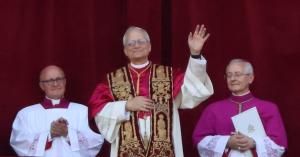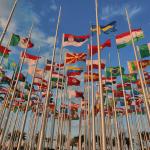
When I heard Cardinal Robert Francis Prevost was chosen to become pope, I, like many, was extremely surprised. He is the first pope to have been born in the United States. He is a native English speaker, whose cultural background, whose political challenges growing up, are similar to my own (with the differences being the time in which he was born). While he did not stay in the United States, because his missionary spirit, the spirit which he promoted in his first speech to the world, had led him to Peru, he still has far more connections to the United States, and what is going in in the United States, than any other pope. Not only does he know the challenges facing the church in the United States, he has already dealt with some of them as the head of the Dicastery for Bishops, as can be seen in the way he handled the situation with Bishop Strickland.
Like so many others, because I was not familiar with him, I searched online for basic information about him. I was especially interested in his ethnic background, and that led me to research not only him, but his parents. That is when I learned that his father was of French and Italian descent, and his mother had a Creole (and Hispanic) background. Because Leo XIV was born in Chicago, and his father had an Italian background, I suspect his family and mine (on my mother’s side) probably had some sort of interaction with each other (what kind, and how much, I do not know; what I do know is that my grandfather was of Italian descent, Roman Catholic, and lived in the Chicago area Leo XIV was from). What I also found interesting is that Leo XIV’s father’s name, Louis, is the same name as my grandfather, and the conclave itself started on my grandfather’s birthday; while that is all coincidental, I suspect my grandfather could not have but looked at the conclave and its outcome without a sense of pride.
Now, to be sure, Pope Leo XIV is more than someone born in the United States; we must understand he has made strong connections to Latin America with his time in Peru, connections which means he is influenced by many of the same Latin American concerns as Pope Francis. He is, therefore, the pope, not just from the United States (or “America”), but the Americas, North and South America alike, and his experience in both will likely come out in what he does as pope.
The next thing I did was try to get a general perspective of his theological and pastoral sensibilities. That he is an Augustinian, in and of itself, tells me many things; I expect he will follow Augustine in dealing with issues as they come instead of follow a scholastic vision which sets up a systematic foundation to use for the exploration of theological (and pastoral) concerns. His choice of papal name, likewise, made me think he intends to focus on social justice concerns, starting with workers’ rights, dealing with them in the modern context. His interaction with J.D. Vance, and his criticism of Donald Trump’s policies on immigrants, suggests that this will be the case, which is why I hope he will be the kind of pope we need at this time, when authoritarian forces are rising up around the world, trying to undermine fundamental human rights and with it, human dignity.
Of course, not everything I read about Pope Leo XIV and what he wrote or spoke upon, had me in agreement with him. This is to be expected. Thus, the way he previously dealt with sexual abuse accusations, certainly, can raise some concerns, but the time in which those actions took place means he could, and hopefully has, grown and that he has learned from his mistakes and will deal with the concerns much better going forward. Similarly, his response as to whether or not the church should ordain women deacons was one, when I saw it, I remember responding to in my own writings on the subject; his perspective, one could say, was pragmatic, as he said he was concerned that if women were ordained to the diaconate, it would lead to a worsening sense of clericalism in the church. My response to this was simple, if what he said was correct, should that not also have us conclude we should not have men ordained as permanent deacons either? That there is good in the diaconate, a good which lies beyond clericalism, suggest that the diaconate should have a place in the church, a place which can and should be open to both men and women, because that is what we find happened in the earliest eras of the church. Now, because his view was pragmatic, I do not know if it is one he will hold fast to or if he is open to change his mind. Obviously, I hope we will see him willing to reconsider and listen to people, even as he has said he has done in relation to the way the church treats many in the peripheries. The fact that he welcomes, indeed, promotes the synodical aspect of Pope Francis’ papacy suggests to me that this might be the case, for why else promote listening to people if he is unwilling to consider what they have to say?
Lastly, listening to what Pope Leo XIV has already spoken on as pope, once again, makes me believe he might indeed the right man for the moment. One of his first concerns he raised is the issue of artificial intelligence, and the moral concerns which arise with its use. It is something we all need to explore because it is impossible to put the genie back in the bottle. We must find a way to live in the new situation and engage it in as moral fashion as possible. Similarly, he has spoken on the need for peace in the world, calling out the aggression happen in Ukraine and Gaza. Once again, this is what needs to be said, so long as the peace established is a just one and helps those who have been unjustly attacked.
While it is difficult to truly predict what is going to happen in Pope Leo XIV’s papacy, to me, it does seem, as many have said, that he will continue many of the initiatives of Pope Francis, helping to strengthen and confirm what has been started, making sure they will continue far into the future. But, from the way I read his pragmatism, I see he will do so with caution, that he might want to slow some things down so that we can take the time we need to get used to the changes already established under Pope Francis before continuing forward, fearing that if we continue go forward without doing so, we might create problems by not considering all the implications of our actions (as perhaps is exemplified by the way Trump and DOGE are destroying the basic functions of government in the United States by their swift actions).
* This Is Part LIX Of My Personal (Informal) Reflections And Speculations Series
Stay in touch! Like A Little Bit of Nothing on Facebook.
If you liked what you read, please consider sharing it with your friends and family!
N.B.: While I read comments to moderate them, I rarely respond to them. If I don’t respond to your comment directly, don’t assume I am unthankful for it. I appreciate it. But I want readers to feel free to ask questions, and hopefully, dialogue with each other. I have shared what I wanted to say, though some responses will get a brief reply by me, or, if I find it interesting and something I can engage fully, as the foundation for another post. I have had many posts inspired or improved upon thanks to my readers.













